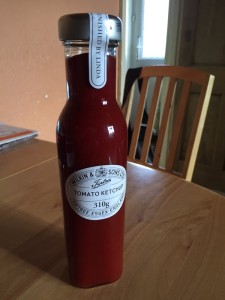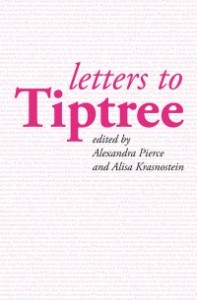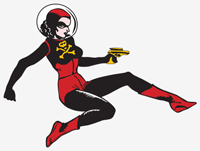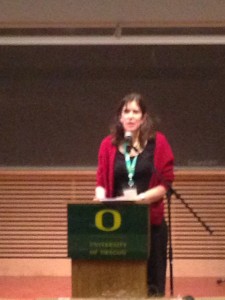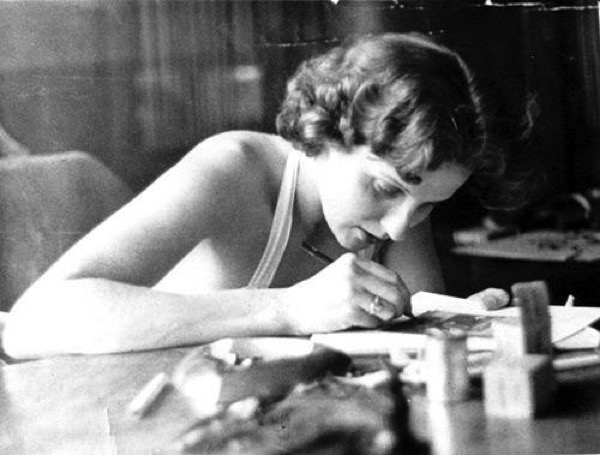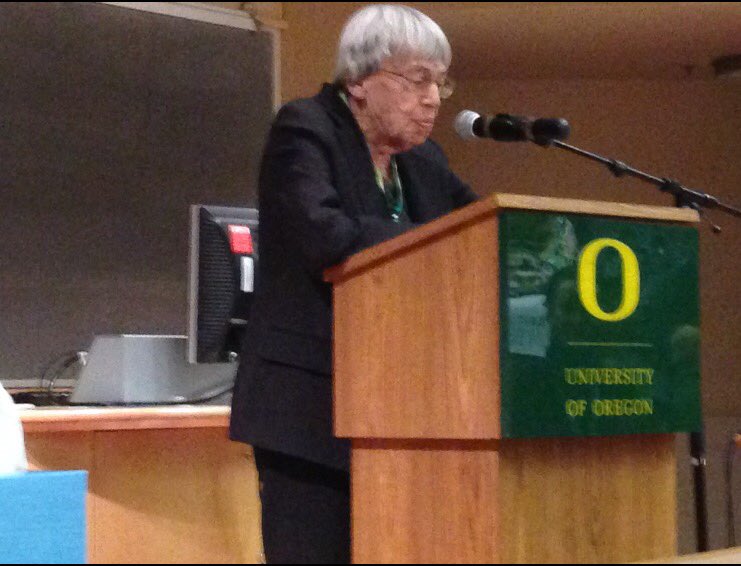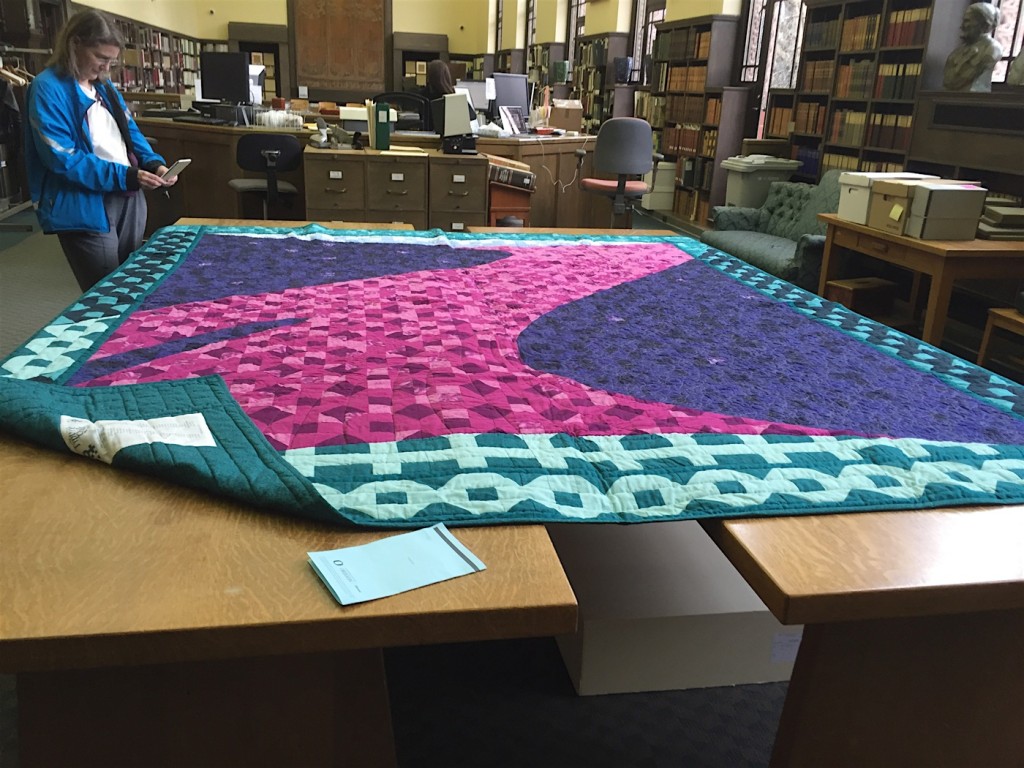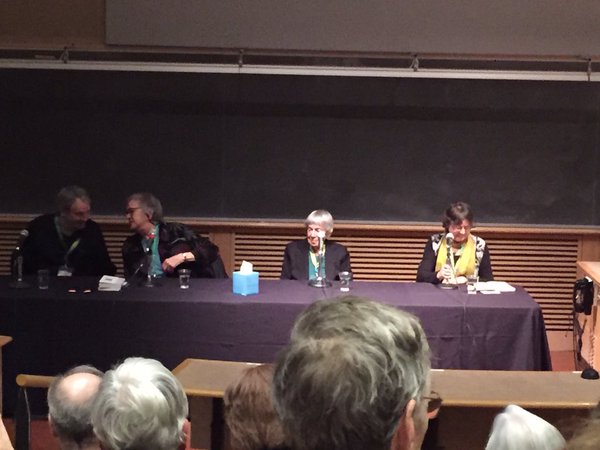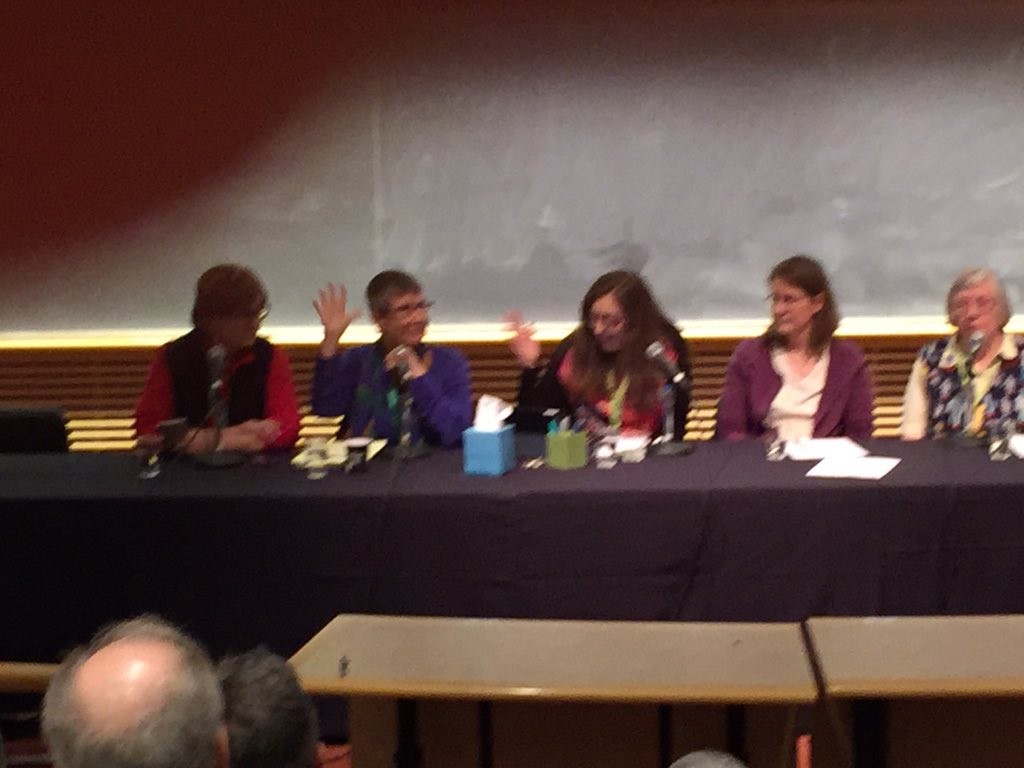Ah, dear friends. This is a hard blog to post, but….
After twenty years of having the honor and pleasure of being the emcee for the Tiptree Auction at Wiscon, I am retiring.
I’m sad, but it’s the right decision. I am no longer a spry young thing. Young at heart, always, but the body is different now, and less able to caper and cavort for hours at a time. Plus, I injured my back in 2014, which has limited my mobility and flexibility, not to mention the ease of traveling. Add to that a general WisConian sense of transition, transformation, and change — and it’s time.
It feels like the end of an era. But what an era it was.
In 1994, on the weekend of my 40th birthday, I was in Worcester, Massachusetts for Readercon, the guest of my friend, Pat Murphy. Ursula LeGuin was the Guest of Honor, and Nicola Griffith was the winner of the Tiptree Award. I knew nothing much about all that, just that the prize was given by an organization that Pat had founded.
One of the committee members in charge of the evening’s banquet and awards ceremony told Pat that some generous people had donated a few items — t-shirts, a handful of books — to benefit the Award, and asked if Pat was willing to auction them off.
Pat was already emceeing the awards and interviewing Ursula, so she said, “No, but I bet my friend Ellen will do it.”
“Sure,” I said. What the heck? It sounded like fun.
And so it was that, at the end of a very long evening, I got up on stage in a hotel ballroom for an impromptu performance, convincing an audience to buy random objects for startling sums of money. Forty-five minutes later, the Tiptree coffers had a thousand dollars, and I was suddenly, accidentally, notorious.
A man asked Spike, “Who is she?”
A total stranger came up to me. “Where else in Worcester are you performing?”
It was a heady experience.
In 1995, I came to Wiscon for the first time. More generous people had donated items, and I did another auction during a Friday afternoon programming slot. It was small, but the Tiptree people were happy, and the audience seemed to have a good time.
The next year, the audience was a little larger. More stuff was donated. The Tiptree Auction was becoming a Thing, and I found myself, a newbie to Wiscon, an odd sort of celebrity.
Stuff kept happening. I joined the Tiptree Motherboard, the organization
thrived with the support of the community, and the auction and I somehow became an Institution.
In the beginning, I felt like my class-clown, childhood self was finally vindicated. Every May, I got to get up on stage — with a microphone — in front of a huge audience — and make people laugh. I also got to spend time on eBay and at garage sales, looking for items that would tickle the Madison fancy. Old space toys, bottles of Lysol, copies of Alice in Elephantland. I spent June through April trying to find things to delight you.
Which is cool enough. But somehow, it just kept getting better. You all started playing right back. I’ll let you in on the secret to the auction’s success: the audience is the real star.
When it works, it’s an energy exchange. I say something funny — you laugh. That makes me feel good, and relaxed, and funnier, and you laugh more and it grows and grows. After a while, you didn’t come just to watch, but to actively participate in the fun.
I don’t know any better way to build community than by shared laughter.
Backed by a shared mythology.
Space Babe.
She started out as email shorthand for one of the designs that Jeanne Gomoll and I were considering for a temporary tattoo. Another little fundraiser. The female space pirate with a blasting ray-gun was just “the space babe.”
She became so much more.
Growing up as science-fiction readers and proto-feminists, those of us of a certain age had to piggyback our imaginations onto whatever the men who controlled popular culture doled out to us. But from the get-go, Space Babe was ours.
I ran with her, shamelessly, and with a huge grin on my face. I made decades-old souvenirs of a popular culture icon that had not actually existed. A back-story with no narrative, just imaginary collectibles. If I leave behind a legacy from my auction years, I hope it’s her. I found that I love making art as much as I love performing.
See, my Dad was a painter, and a photographer, and a craftsman. And when I was a kid, I kept overhearing my mother say to her friends, “Oh, the girls all take after me, I’m afraid. Jack is the only artist in the family.” I cringed, hearing that, because I liked making things. But I knew — because I was told — that I wasn’t very good at it. I couldn’t draw — still can’t — and my art projects in school were judged as colorful, but inferior, lumps. Never the ones picked to be displayed on the bulletin board.
The first time I dared to make something for the auction, I was terrified no one would want it. But you did. You gave me permission to make art. And those are some of my favorite memories — being down in my basement for hours at a time, messing about with paints and glue (and Photoshop), turning up in Madison with boxes of things that I made myself, and that amused other people.
My mother is long dead, so she’ll never know that today my art is in private collections in Vienna and London and New York. But I do. And I thank you for opening a part of me that I hadn’t even let myself dream might exist.
Performer, artist, author. I would be none of these today without your support. I have loved the applause, the acclaim, the “celebrity, ” and am forever grateful for how that contributed to my recognition as a writer, especially early in my career.
Like most people, I have many personas. The auctioneer is loud, fearless, funny. The words that come out of my mouth on stage are spontaneous, stream-of-thought, in-the-moment, and ephemeral. Your acceptance of her gave me the courage to allow a much smaller, quieter voice to emerge. My writing is planned and thoughtful. The words you see in print are honed and carefully chosen.
So thank you for allowing me the space for both voices to be heard. For reading my fiction, and for applauding when I got up on stage and put on my chicken suit or shaved my head or did The Happy Dance.. I don’t know any other performer who has gotten the chance — even once — to and do a three-hour, one-woman show.
Well, sort of. It has never really been a one-woman show at all. Although I’ve been the public face of the auction, I’ve always have had a team behind me doing the hard work — sorting, preparation, and logistics. And other folks collecting the money and doing the math.
Jeanne Gomoll — a national treasure — was, for a long time, the person accepting donations, setting up the display of items, and making sure the trains ran on time. Scott Custis hauled boxes down from their attic every year. Jim Hudson, a mensch if there ever was one, handled the accounting, a most important part of any fundraiser. In recent years, Nevenah Smith streamlined the process and added her own flair to the event.
It’s been twenty years. There are dozens, maybe hundreds, of people who have supported the auction, the Tiptree Award, and/or Wiscon whose hard work, technical expertise, and enthusiasm made me look good up there.
To them, and to all of you — I enjoyed every minute.
Thanks for a great run.
— Ellen
PS-1: Fundraising for the Tiptree Award will go on. We will continue to offer you choice items in return for your support.. There will be future auctions, some live, perhaps some online. I may even participate in them, but not as a solo act.
PS-2: The auction was one of the centers of my life for a very long time. But because each of them was one long improvisation, happening as fast as I could talk, I honestly don’t remember much about individual moments. I’m hoping that you do, and that you’ll use the Comments to share your memories with me.
